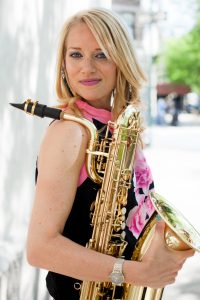The WiMN’s Front and Center is a weekly column that showcases accomplished women who work in the music and audio industries. We spotlight successful female performers, manufacturers, retailers, educators, managers, publicists, and everyone else in between. Want to be featured? Learn how here.
Front and Center: Grammy® Award-winning Saxophonist Lauren Sevian
By Leslie Buttonow

Award-winning saxophonist Lauren Sevian started performing professionally at age 12, first on the piano, then on the saxophone. By age 16, she had won the Count Basie Invitational soloing competition and a feature performance with the Basie Band. By the time Sevian was 17, she had already performed at Carnegie Hall and Lincoln Center, and knew that playing saxophone was something she wanted to pursue full-time. She went on to earn a music degree from the prestigious Manhattan School of Music, and began her career as a regular member of the Mingus Big Band.
Some highlights of Sevian’s early career also include an appearance in the movie Mona Lisa Smile starring Julia Roberts; recording with Greg Osby for Joan Osbourne’s Breakfast in Bed album; and performing with a diverse array of artists including Christian McBride, George Duke, Jane Monheit, and Maceo Parker, among many others.
Other distinctions include becoming the first female saxophonist to tour with the legendary Count Basie Orchestra in 2014. She has also received numerous awards, including a Grammy® Award for the live album, Mingus Big Band Live at the Jazz Standard.
In addition to performing, Sevian is also a teacher, clinician, conductor, and adjudicator, sharing her talents and educating and guiding students at the Litchfield Jazz Camp, the Monterey Jazz Festival’s Next Generation Jazz Festival, the Brooklyn Conservatory, and others.
For more info, and to view Sevian’s upcoming performances, visit laurensevian.com.
WiMN: Sometimes when children first learn instruments, they try a few before finding the one that’s right for them, or they have trouble deciding. How did you come to know that the baritone sax was “the one” for you?
LS: I knew the baritone was the right instrument for me after I first played it. It felt like my voice, and I was immediately connected to it. When I put air through it, I felt a response like no other. I also came across the baritone in high school, after playing piano and alto saxophone. I wanted to play saxophone, but always sensed something was missing when I played alto. After my teaching encouraged me to try the baritone, that was it!
WiMN: How were you able to balance school and performing in your teens?
LS: It took a lot of discipline, but my philosophy was always “Work hard and play hard.” I have a very supportive family who took me to as many musical events as possible and encouraged me every step of the way. I also had the desire to practice and didn’t need to be pushed to do so. As I became more serious with music, continuing with my academic schedule was difficult, but having good grades was important to me. At various points, certain activities had to be sacrificed so I could continue my musical endeavors. If you’re serious about what you do, you will come to a junction where you have to make choices to pursue your dreams.
WiMN: Did you know at the time that music was what you wanted to do for a living?
LS: I did know by junior year I wanted to be involved in music, but was thinking more along the lines of music education. In my senior year, I started to think that I wanted to pursue performance, and the universe gave me the signal. I auditioned for Manhattan School of Music and was accepted. I then knew for sure that was what I was meant to do!
WiMN: You’ve had a wide array of performance experiences, from recording sessions, to club dates, to large jazz festivals. What do you like about each? Any favorite(s)?
LS: I’m very fortunate to have a career that’s exciting and diverse. Recording sessions offer you the opportunity to really dig in and fine tune the music; in a way it’s an art form of its own. Then the experience is documented so you can enjoy it forever! It can be a very uplifting experience being in a room with people you respect and admire, and then you get to create something with them — it’s very rewarding. Club dates are a great way to make a living, and you get to witness people dancing and enjoying themselves. It’s wonderful to watch people move to the music. Jazz festivals are such a blast, and you get to connect with people there who you may not be performing with, but the camaraderie is so enjoyable. Some of the best times I’ve had were when I ran into my NY friends at a festival somewhere in Europe. It’s so hard to name favorites, but a memorable tour for me was my first with the Mingus Band in 2003, when we went to Israel, Italy, and Switzerland. Also, a cross country trip with Denis Leary, and Thailand and Japan with the Count Basie Orchestra. Ireland was very memorable as well. I could probably keep going!
WiMN: You’re also a music educator. What do you enjoy most about teaching others?
LS: Teaching is very important to me. I love talking about jazz, music, and life with others. What I enjoy the most about music is sharing and love. Being a mentor to others pursuing this music is something I take very seriously. It’s becoming more critical to spread the word about this music and for it to be taught in schools, because it’s part of history — part of OUR history as Americans. I also encourage young women to play jazz, as it can effectively inspire confidence and healthy self-esteem.
WiMN: What advice would you give to young girls who are enrolled in a music education program and looking to possibly pursue a career in music?
LS: My advice to young women is very simple. Empower yourself with as much knowledge as possible and work hard at what you do. No one can take your skills away from you. You have an opportunity to be in a safe and creative environment; take advantage of that as much as possible. Look to other women who inspire you and ask for help and guidance. The business can sometimes be harsh on women, so know that it exists and there are often double standards, but if you stay focused on your craft, that will outshine everything else.
WiMN: And what would you say to adult musicians looking to further their career?
LS: My advice to the adult musicians trying to further their career would be to seek out as many playing opportunities as possible. Go out to jam sessions and/or open rehearsal; play/sit in if possible, and let people know that you’re available to sub for rehearsals, gigs, etc. By putting your face out there, people will remember that and are going to think of you as someone to call. Once you start building that up, it’ll start leading to bigger gigs and opportunities. The key is to remain hungry, yet humble. Being on time and showing up with a positive attitude and vibe makes a big impact!








